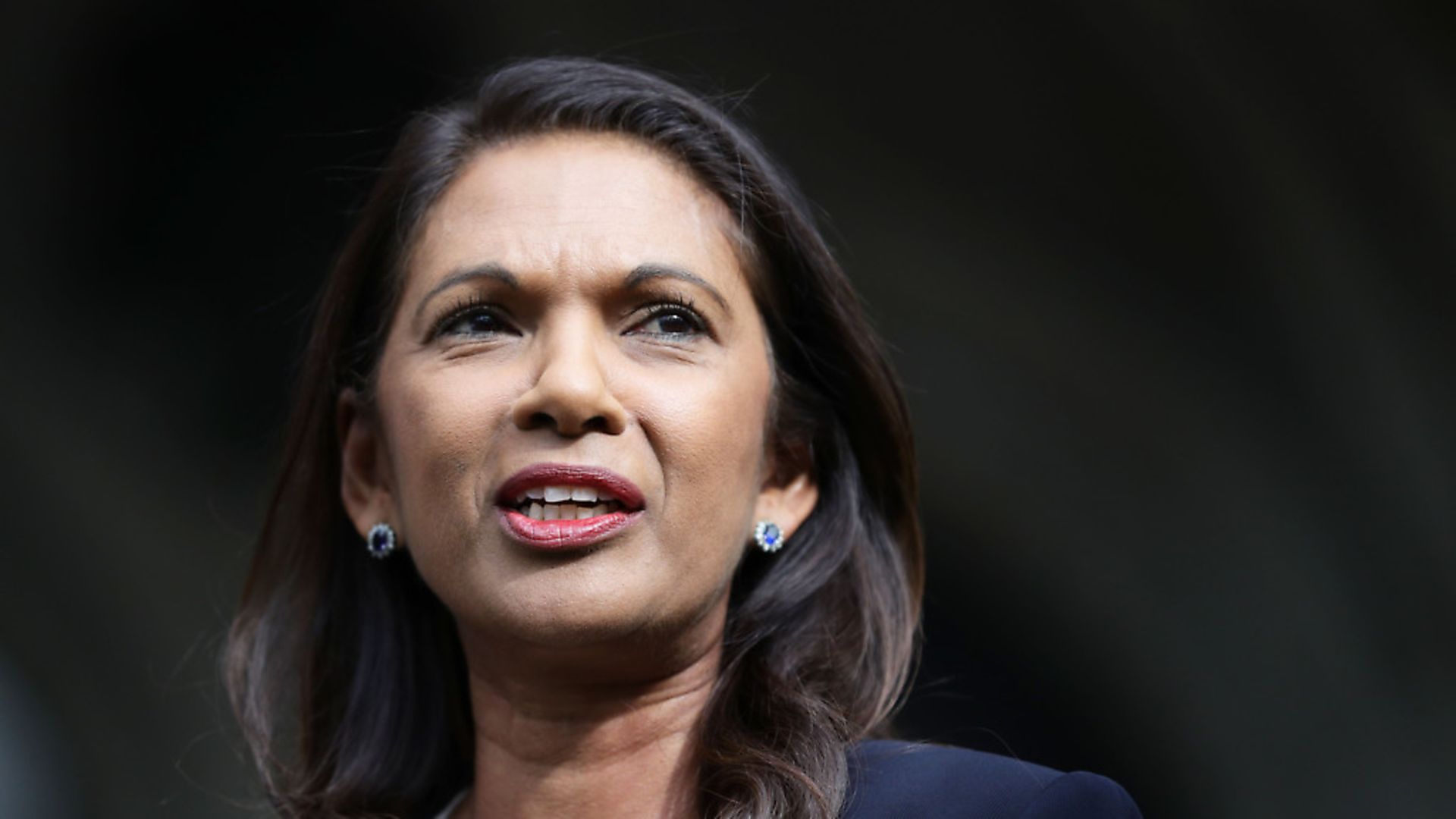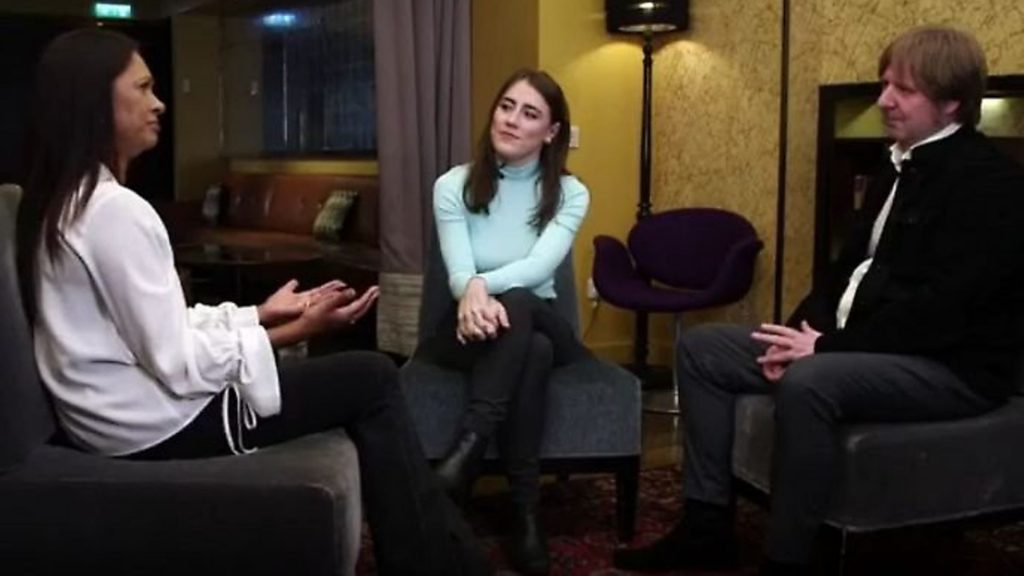
Campaigner GINA MILLER on how she came to bond with a troll who had been abusing her online.

‘There are no strangers,’ William Butler Yeats once dreamily observed. ‘Only friends you haven’t met yet.’
One wonders if the Irish poet would ever have come to such a conclusion if he’d lived to see the advent of the internet. All too often, it’s facilitated hatred for me from individuals who have troubled neither to get to know me nor to seek me out in person to air their innumerable grievances.
I’m not of course the only victim of online abuse, but the two court cases I won against the governments of Theresa May and Boris Johnson – both concerned with upholding parliamentary sovereignty and our constitution – inevitably made me something of a poster girl for hate.
Certain politicians and tabloid newspapers whipped this up into a frenzy, and, at the height of it, Viscount St Davids was convicted on two counts of malicious communications for attempting to incite someone to kill me by offering a £5,000 bounty online.
There are other cases pending, but what is clear from my experience is that online bullying and threats are the preserve of no one social class, educational level or political persuasion. They are almost always men, however, and, they never have the courage to say what they have to say to my face, less still to argue out their positions.
I have always relished the opportunity to debate with people who disagree with me, and, since the beginning of the EU referendum campaign, I deliberately went out of my way to travel to areas of the country that looked most likely to vote for Brexit.
When I subsequently launched my End the Chaos campaign to fight for greater transparency about the way we were leaving the EU, we launched in Dover, a town that had voted to leave.
I saw no point then – and I see no point now – in preaching to the converted.
Have your say
Send your letters for publication to The New European by emailing letters@theneweuropean.co.uk and pick up an edition each Thursday for more comment and analysis. Find your nearest stockist here or subscribe to a print or digital edition for just £13. You can also join our readers' Facebook group to keep the discussion and debate going with thousands of fellow pro-Europeans.
So, when the BBC came to me before lockdown to suggest I meet up with one of my online tormentors – he was willing to be filmed, but not to be fully identified – I readily agreed to meet ‘Alan’.
Years of working with charities concerned with gangs, domestic violence and grooming has taught me the power of a face to face encounter, and I have learned that it’s always hard to hate people when you get to know them.
The programme was called Crossing Divides, a season of BBC specials about bringing people together in our fragmented world. The researchers said that Alan had been responsible for some of the most hateful messages about me online. He posted them on Facebook – where I don’t happen to have an account – but what he had said was strong stuff.
Presented with what he had written, I was immediately struck by the allusions to wars and soldiers and that within this world people like me were the enemy. I was not human, a person, a mother, but an insect, an ape, an animal.
Sadly, it confirmed some conclusions I’d long since drawn about our broken society: the disenfranchisement, hurt and anger at being neglected, ignored, let down were manifest in everything Alan had to say.
The BBC team were set up and waiting as I entered the designated room at the Hospital Club in central London. Alan had not yet arrived and they informed me he would be in a different room so that the cameras could capture our reactions when he was brought in to meet me.
I’d heard that Alan had arrived and the team started to talk about how he had ‘made a real effort in his appearance’, which I saw as a mark of respect. He was going into this, as I was, in a positive frame of mind.
The first moments when he was brought in were inevitably highly-charged. I determinedly tried to stay calm, made eye contact and he responded in kind, which struck me as the first of many barriers between us coming down.
He was a single father who worked as a hotel concierge and life for him had been very tough. He felt that nobody was listening to him, nobody cared. We talked for nearly an hour and we both allowed the other to speak.
After a while, it became clear we both wanted much the same things – politicians who tell the truth, a country that is fair and looks after the most vulnerable, and where our two 14-year-old sons never have to go to war.
He had the idea that life had somehow been very easy for me, but when I mentioned I’d had to sleep in my car for some weeks after a miserable marriage – caring on my own for my special needs daughter – he started to realise the hateful entitled figure he’d conjured up in his mind was far from the reality.
When I talked about some of the more extreme things that had been said about me by others, I found him shaking his head and saying that it was out of order.
I suppose we’ve all said things we’ve regretted, but when we engage with people face to face, we can see the hurt we cause – deliberately or inadvertently – and that’s what makes us immediately backtrack or even apologise.
You can’t see the facial reactions when you abuse people online and that of course is the paramount problem. The mistake I’ve never made is in dehumanising the people who dehumanise me online. I don’t even like the term ‘troll’.
Casting our online antagonists in the clothing of ancient Norse figures – invariably portrayed as ugly, stockier, brutish and dim-witted – hardly paves the way for a meeting of minds.
Norman Johnson, an associate professor at Bauer College at the University of Houston, says the anonymity afforded by the internet is a key factor in the dehumanisation.
In his words: ‘The introduction of anonymity not only makes users feel free from the repercussions that might otherwise give them pause, but it also dehumanises potential targets. In other words, the internet gives all our worst impulses just what they need to thrive.’
I have to say Alan wasn’t such a bad guy. He gets angry sometimes, but who among us doesn’t? The only difference was he vented his spleen online.
He told me he felt ‘terrible’ about what he had said and added: ‘Now I’ve met you and heard where you’re at, I see it was the wrong thing for me to have done.’
I’d say it was one of the most uplifting things I’d heard anyone say in years. In an increasingly divided and angry world, Alan I achieved that rare thing: a meeting of hearts and minds.









